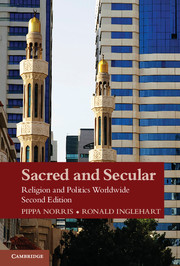Book contents
- Frontmatter
- Contents
- Tables
- Figures
- Preface and Acknowledgments
- Part I Understanding Secularization
- Part II Case Studies of Religion and Politics
- 4 The Puzzle of Secularization in the United States and Western Europe
- 5 A Religious Revival in Post-Communist Europe?
- 6 Religion and Politics in the Muslim World
- Part III The Consequences of Secularization
- Conclusions
- Appendix A
- Appendix B
- Appendix C
- Notes
- Bibliography
- Index
4 - The Puzzle of Secularization in the United States and Western Europe
from Part II - Case Studies of Religion and Politics
Published online by Cambridge University Press: 05 June 2012
- Frontmatter
- Contents
- Tables
- Figures
- Preface and Acknowledgments
- Part I Understanding Secularization
- Part II Case Studies of Religion and Politics
- 4 The Puzzle of Secularization in the United States and Western Europe
- 5 A Religious Revival in Post-Communist Europe?
- 6 Religion and Politics in the Muslim World
- Part III The Consequences of Secularization
- Conclusions
- Appendix A
- Appendix B
- Appendix C
- Notes
- Bibliography
- Index
Summary
despite the wealth of evidence for secularization that we have documented in postindustrial societies, critics could argue that we still have not accounted for important anomalies in these patterns. The strongest challenge to secularization theory arises from American observers who point out that claims of steadily diminishing congregations in Western Europe are sharply at odds with U.S. trends, at least until the early 1990s.
To consider these issues, Part II describes systematic and consistent evidence establishing the variations in religiosity among postindustrial nations, in particular contrasts between America and Western Europe. This chapter focuses upon similar postindustrial nations, all affluent countries and established democracies, most (but not all) sharing a cultural heritage of Christendom, although obviously there remains the critical cleavage dividing Catholic and Protestant Europe. All these are service-sector knowledge economies with broadly similar levels of education and affluence, as well as established and stable democratic states. This framework helps to control for many of the factors that might be expected to shape patterns of religiosity, allowing us to compare like with like. This process facilitates the “most-similar” comparative framework, thereby narrowing down, or even eliminating, some of the multiple factors that could be causing variations in religious behavior. This chapter examines whether the United States is indeed “exceptional” among rich nations in the vitality of its spiritual life, as the conventional wisdom has long suggested, or whether, as Berger proposes, Western Europe is “exceptional” in its secularization. On this basis, Part II then considers evidence to test religious market, functionalist, and security theories of secularization. Religious market theory postulates that intense competition between rival denominations generates a ferment of activity explaining the vitality of churchgoing. Functionalist explanations focus on the shrinking social role of religious institutions, following the growth of the welfare state and the public sector. We compare evidence supporting these accounts with the theory of secure secularization, based on societal modernization, human development, and economic inequality, that lies at the heart of this book.
- Type
- Chapter
- Information
- Sacred and SecularReligion and Politics Worldwide, pp. 83 - 110Publisher: Cambridge University PressPrint publication year: 2011



